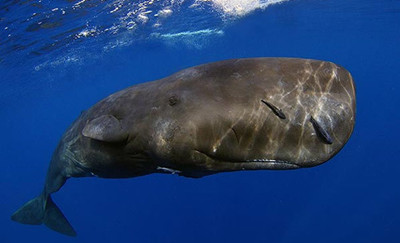(单词翻译:单击)
听力文本
We humans are social creatures—we stick together.Family traditionally came first.Then more distant relatives.
Then larger groups of unrelated individuals, connected by culture.
But it turns out the same could be said for sperm whales.
"So usually you find the female, and their mom and the grandmas and their aunts, and they all stay together for many years."
Mauricio Cantor, a biologist at Dalhousie University in Halifax, Nova Scotia.
He says those closely related family groups then seek out other families with similar behavior:"They tend to hang out or stay together with those who produce the same kinds of sounds."
Meaning whale cliques are based on producing similar clicks.
And similarly clicking whales don't just hang out together, he says.
They also emulate each other's songs, or codas.
Meaning clans of whales evolve their own dialects—their own form of culture.
And these dialects are key.
Cantor and colleagues built a computer simulation of generation after generation of virtual whales.
And they found that no other factor—like genetics or mother-daughter teaching—could explain the emergence of the clans and dialects in real sperm whale society.
The study appears in the journal Nature Communications.
"I'm not trying to say that the types of culture the whale has are the same as human culture.
Obviously human culture is much more diverse and complex and cumulative and symbolic.
But it's very fascinating just to see that they can have some type of similarities, they can have their own type of culture."
And maybe a better understanding of that whale culture, he says, might persuade a few human cultures to be a bit more conservation-minded, when it comes to whales.
参考译文
我们人类是社会动物—我们团结在一起。传统观念上首当其冲是家庭。而后才是远亲。
紧接着是通过文化相连不相关个体的更大规模群体。
但结果表面抹香鲸也是如此。
“因此你通常会发现雌性抹香鲸,还有她的母亲,祖母及姑姑多年一起共同生活。”
穆里科·卡特尔是新斯科舍哈利法克斯达尔豪西大学的一名生物学家。
他表示那些关系紧密的家庭会寻找同自己行为非常相近的其他家庭:“它们会寻找和自己发出相同声音的群体在一起。”
这也表示鲸鱼派系是依照类似的发声划分。
而且这些相似的鲸鱼不仅一起玩耍。

它们还会互相模仿对方的叫声及末尾音节。
这表明鲸鱼通过自己的语言甚至这种自己的文化不断繁衍。
而且这些语言对它们而言至关重要。
卡特尔和他的同事们建造了一套计算机程序模拟一代又一代的虚拟鲸鱼。
而他们发现没有如基因遗传或母女相传等任何因素能够解释在真实的抹香鲸群体内出现的族群和方言。
这项研究已在《自然交流》期刊上发表。
“我并不是想说鲸鱼的文化类型同我们人类的一模一样。
很明显人类的文化更加多元、更为复杂,更具积淀而且更赋象征意义。
但是很有趣的是能够在人类与鲸鱼间发现很多相似的地方,而且二者都有各自的文化。”
或许更加深入理解鲸鱼的文化可以让我们在谈论它们的时候,一少部分人的文化理念更为保守。
译文为可可英语翻译,未经授权请勿转载!
重点讲解
1.turn out 关掉; 结果是
例句:They'd turn out to disappoint me.
他们的表现就会令我失望。
2.seek out 寻找
例句:You must seek out your destiny.
你一定得找到你的命运。
3.tend to 趋向; 朝某方向
例句:But old men tend to die on me.
但是老人很容易死在我手里。
4.hang out 闲逛
例句:You wanna hang out tonight?
你想今晚一起出去吗?


